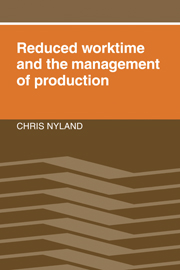3 - Worktime and the effort bargain
Published online by Cambridge University Press: 25 March 2010
Summary
Thus far this work has validated Marx's claim that the temporal and intensive aspects of worktime are inversely related. It has also been shown that human needs and limitations have been a major factor restricting the length of time workers labour, that changes in the level of work intensity are both a cause and a consequence of the downward movement of working times and that time schedules considered normal during the nineteenth century are now too long to be considered efficient. What will now be examined is the way the intensive and extensive worktime dimensions together influence and shape the struggle between the classes over the mass of labour that workers normally undertake.
A fair day's work
Central to the worktime issue is the concept of a fair day's work. Significant differences generally exist between employer and worker as to what this consists. This reflects the fact that the former is a buyer and the latter a seller of labour power. The differing perspective is not resolved by the forging of an employment contract. Such an arrangement normally consists of two elements: first, an agreement on the wage per unit of time or piece; second, an agreement on the amount of work to be undertaken, that is, an effort bargain. It is normal for the wage rate to be precisely defined in the employment contract. The effort bargain, on the other hand, is generally implicit and indistinct. Little is said about efficiency or about “how much effort is expected for a given wage. … The details of the arrangement are left to be worked out through the direct interaction between the partners of the contract”(Baldamus 1961:35).
- Type
- Chapter
- Information
- Reduced Worktime and the Management of Production , pp. 67 - 98Publisher: Cambridge University PressPrint publication year: 1989



